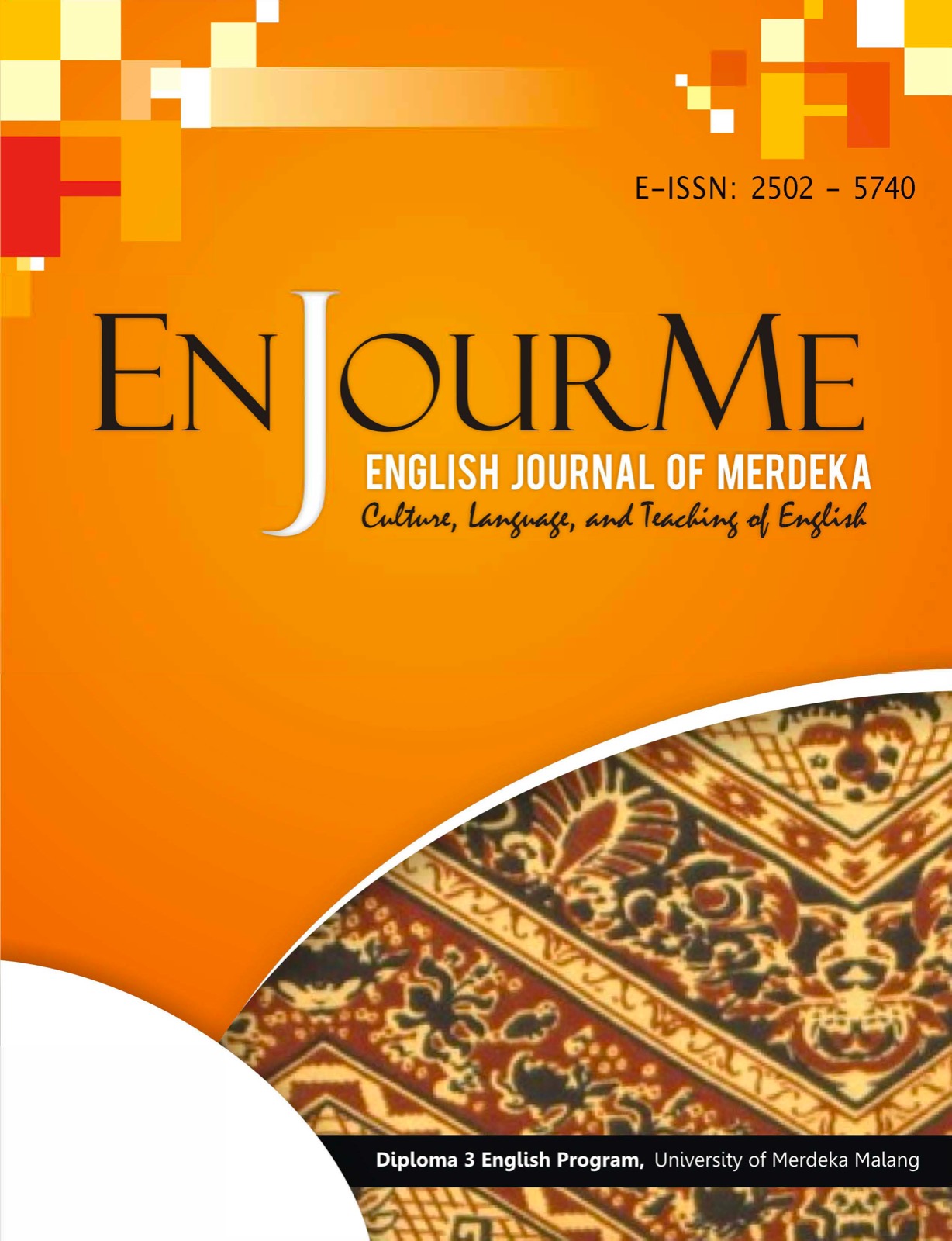A systematic review on the significance of reflective teaching in teaching performance
DOI:
https://doi.org/10.26905/enjourme.v8i2.11785Keywords:
Teaching reflection, self-reflection, writing diary, peer observationAbstract
Reflective teaching is vital for improving teaching performance. Self-reflection has been expected to bring a positive impact on reflective teaching. Hence, this study explores the significance of reflective teaching with two research questions: 1) How is reflective teaching through self-reflection seen? 2) What are the best strategies for implementingreflective teaching? The study was conducted with a qualitative approach through systematic review by analyzing some studies related to the research variables. Previous studies on the research questions were formulated, followed by analyzing and synthesizing the data. The result of the study indicates that the importance of journaling or keeping a diary for teachers as a means of self-reflection is still relevant today and still plays a role in teaching reflection. However, teaching reflection alone does not completely assist teachers in receiving thorough and beneficial reflection to enhance their teaching performance. Other important strategies such as peer observation, reflection training, peer observation, and the use of students such as students' assessment and results also carry out important parts in reflective teaching.Downloads
References
Brookfield, S. (1995). The getting of wisdom: What critically reflective teaching is and why it's important. Becoming a critically reflective teacher, 1-28.
Cameron, J. J., Wilson, A. E., & Ross, M. (2004). Autobiographical memory and self-assessment. The self and memory, 207-226.
Cosh, J. (1998). Peer Observation in Higher Educationâ€â€A Reflective Approach. Innovations in education and training international, 35(2), 171-176.
Darling-Hammond, L., & McLaughlin, M. W. (1995). Policies that support professional development in an era of reform. Phi delta kappan, 76(8), 597-604.
Dewey, J. (1933). How we think : A restatement of the relation of reflective thinking to the educative process / by John Dewey. Boston; New York: D. C. Heath and company.
Garmston, R. J. (1997). Self-Reflection: The Teacher is Within. Journal of Staff Development, 18(1).
Gosling, D. (2002). Models of peer observation of teaching. Generic Centre: Learning and Teaching Support Network. Retrieved, 8(10), 08.
Gibbs, G. (1988). Learning by doing: A guide to teaching and learning methods. Further Education Unit.
Gün, B. (2010). Quality self-reflection through reflection training. ELT journal, 65(2), 126-135.
Hargreaves, A. (1998). The emotional practice of teaching. Teaching and teacher education, 14(8), 835-854.
Hativa, N., & Goodyear, J. (Eds.). (2001). Teacher thinking, beliefs and knowledge in higher education. Springer Science & Business Media.
Hiemstra, R. (2001). Uses and benefits of journal writing. New directions for adult and continuing education, 2001(90), 19.
Keig, L., & Waggoner, M. D. (1994). Collaborative Peer Review: The Role of Faculty in Improving College Teaching. ASHE-ERIC Higher Education Report No. 2. ASHE-ERIC Higher Education Reports, George Washington University, One Dupont Circle, Suite 630, Washington, DC 20036-1183.
Kember, D., Leung, D. Y., & Kwan, K. (2002). Does the use of student feedback questionnaires improve the overall quality of teaching?. Assessment & Evaluation in Higher Education, 27(5), 411-425.
Kolb, D. A. (1984). Experience as the source of learning and development. Upper Sadle River: Prentice Hall.
Lailiyah, M. (2016). Content and Language Integrated Learning in Teaching English as Second Language: A Systematic Review of Empirically Based Articles. EnJourMe (English Journal of Merdeka) : Culture, Language, and Teaching of English, 1(1). doi:https://doi.org/10.26905/enjourme.v1i1.278
Motswiri, M. J. (2003). Effective preparation of teachers for life-long learning: The role of an induction programme. Gaborone. University of Botswana.
Newman, M., & Gough, D. (2020). Systematic reviews in educational research: Methodology, perspectives and application. Systematic reviews in educational research: Methodology, perspectives and application, 3-22.
Pedrosa-de-Jesus, H., Guerra, C., & Watts, M. (2017). University teachers' self-reflection on their academic growth. Professional development in education, 43(3), 454-473.
Rahgozaran, H., & Gholami, H. (2014). The impact of teachers' reflective journal writing on their self-efficacy. Modern Journal of Language Teaching Methods, 4(2), 65-74.
Scanlan, J. M., Care, W. D., & Udod, S. (2002). Unravelling the unknowns of reflection in classroom teaching. Journal of advanced nursing, 38(2), 136-143.
Srimavin, W., & Darasawang, P. (2003). Developing self-assessment through journal writing. In Proceedings of the Independent Learning Conference.
Sullivan, P. B., Buckle, A., Nicky, G., & Atkinson, S. H. (2012). Peer observation of teaching as a faculty development tool. BMC medical education, 12(1), 1-6.
Snyder, H. (2019). Literature review as a research methodology: An overview and guidelines. Journal of business research, 104, 333-339.
Wang, X. (2022). The reflective teaching practice of teachers based on optimal teaching quality. International Journal of Emerging Technologies in Learning (Online), 17(15), 156.
Widya, T., Fatimah, A. S., & Santiana, S. (2020). Students' Feedback as A Tool for Reflection: A Narrative Inquiry of An Indonesian Pre-Service Teacher. TLEMC (Teaching and Learning English in Multicultural Contexts), 4(1), 1-11.
Additional Files
Published
How to Cite
Issue
Section
License
Authors who publish with this journal agree to the following terms:
(1) Copyright of the published articles will be transferred to the journal as the publisher of the manuscripts. Therefore, the author confirms that the copyright has been managed by the journal.
(2) Publisher of EnJourMe (English Journal of Merdeka) : Culture, Language, and Teaching of English is University of Merdeka Malang.
(3) The copyright follows Creative Commons Attribution–ShareAlike License (CC BY SA): This license allows to Share — copy and redistribute the material in any medium or format, Adapt — remix, transform, and build upon the material, for any purpose, even commercially.




